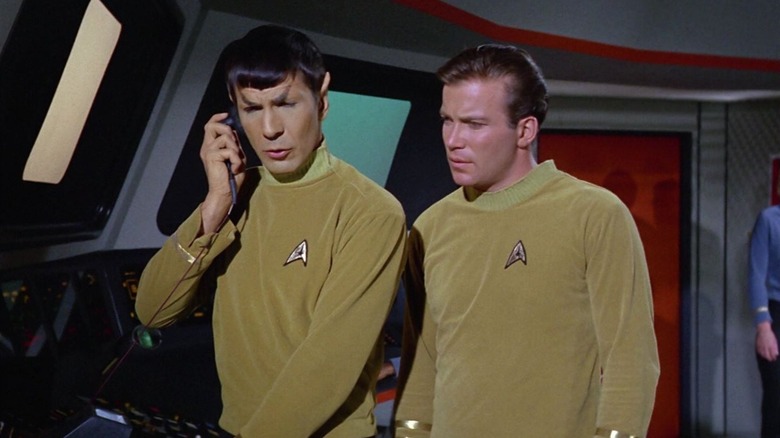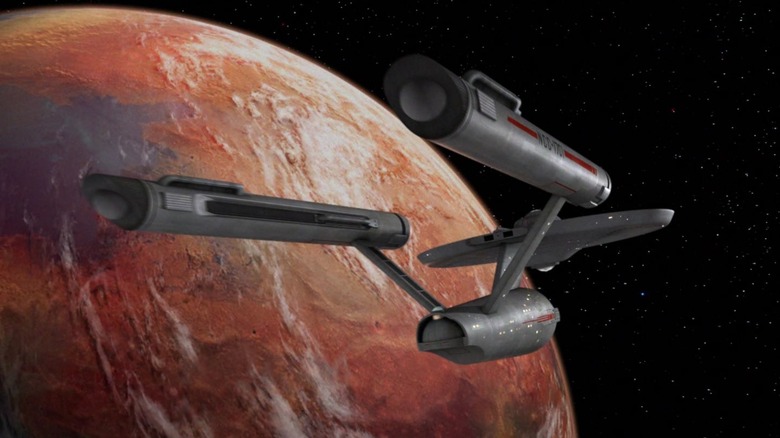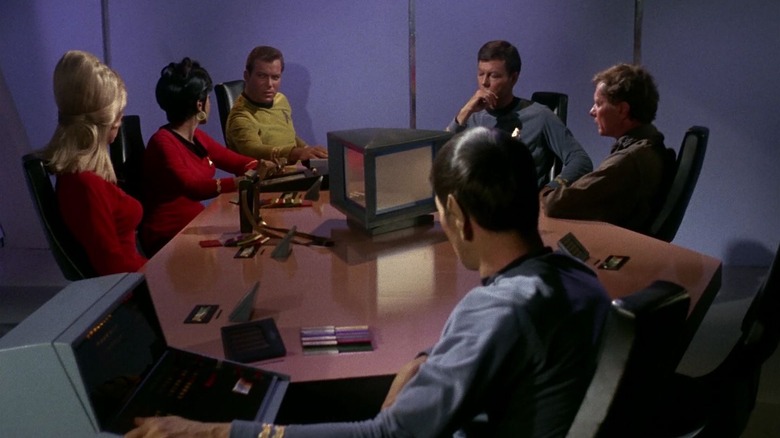What Foundation Writer Isaac Asimov Thought About Star Trek
Isaac Asimov was asked about science fiction a lot. He would be an expert in the topic, after all, seeing as he wrote some of the most influential and ambitious sci-fi stories ever penned. His "Foundation" book series (1951 – 1993) is still pored over by sci-fi nerds to this day, and every single robot story owes a debt to his book "I, Robot" (1950), the first time the Laws of Robotics had been codified in print. He also wrote the famous stories "Nightfall," "Fantastic Voyage," and hundreds of others. Without Asimov, science fiction as we know it wouldn't exist.
In 1973, Asimov appeared at a "Star Trek" convention to talk about sci-fi and Gene Roddenberry's recently canceled series. It should be noted that "Star Trek" conventions were still something of a novelty in 1973, and the series was only really starting to explode in popularity. "Star Trek" was never a giant hit when it was on the air, but it found a widespread audience in the 1970s thanks to incessant reruns. It was in the '70s, too, that many fans began to zero in on why "Star Trek" was revolutionary. Roddenberry's series, for instance, depicted a post-war world of utopian multiculturalism, wherein all nations and races had united. What's more, it was a sci-fi show devoted to peace. The U.S.S. Enterprise was not on a mission of conquest, and never charged into battle with guns blazing. They would rather open up diplomatic relations.
In the 1973 interview, Asimov said that he was particularly impressed with the idea of a Prime Directive. He liked the idea that our human culture would, in a very respectful way, leave other cultures alone. As discussed in /Film before, the Prime Directive was an anti-colonialist measure. Asimov liked that.
Isaac Asimov loved the idea of the Prime Directive
Asimov began his description of "Star Trek" by addressing its opening narration, which begins with the phrase "To boldly go where no man has gone before." Asimov pointed out that the phrase has two meanings. One the one had, it's certainly literal, "they mean it territorially," he said. "They're visiting stars that no man has, 'til now, never visited. They're going vast distances no man has ever penetrated." But that was just part of the story. As he continued:
"[I]n addition, they're meeting problems that man has not faced. [What] 'Star Trek' really presented was the brotherhood of intelligence. It mattered not what form the intelligence took. Or what kind of universe the intelligence built for itself. If it was intelligent — if it was intelligent enough to build a culture — then it had the right to live in that culture. It had the right to exist and be. And no other culture had a right to interfere with it, as long as it was not endangering cultures beyond itself."
This is, of course, often mentioned by Trekkies. While the show's fictional Federation may have lived by an admirable code of ethics, the organization never forced their philosophy onto others. There was no sense of occupation, of spreading territory. It was always just about leaving others in peace. Asimov said:
"'Star Trek' was, in a sense, the sanest, the most meaningful... it tackled real social problems. It was not devoted entirely to adventure. And most of all, it had fully realized characters. Naturally, Spock springs to mind. The rational, sane man. And there's something very comforting about sanity. Especially in a world like ours."
Spock, of course, being the logical Vulcan first officer played by Leonard Nimoy.
Asimov knew about the politics of television
Asimov also noted the frustrating divide between art and commerce. A great, artistic, philosophically daring TV series can easily attract a passionate group of cultists, but still be beholden to the caprices of money. This message has only become more true over time (doubly so during the second Trump administration, when supra-mergers are becoming heartbreakingly common). In Asimov's words:
"No matter how successful 'Star Trek' was with its viewers, no matter how intensely it pleased its viewers, unfortunately the medium of television these days, depends entirely upon a mass audience. They sell advertising time. That is their business. The program is merely a way of enticing you to watch the advertising. And if there isn't enough of an audience, the advertisers won't come, regardless of how intensely it pleased the audience is does get."
This refrain was likely common among Trekkies, who knew all about the struggles "Star Trek" went through, ratings-wise, during its initial run. It only lasted three seasons, and was only saved part way through thanks to Bjo Trimble's letter-writing campaigns. "Star Trek" was vital and important, but wasn't successful enough to reach a mass audience. Asimov didn't pass away until 1992, however, so he lived long enough to see "Star Trek" revived in the form of "Star Trek: The Next Generation" and through the first six feature films. Indeed, in 1979, Asimov was hired as a special science consultant on "Star Trek: The Motion Picture." He wasn't just a fan, he was a contributor. Asimov was later namechecked on a "Next Generation" episode, when a character described an android's brain as "Asimov's dream." The man was a master.


